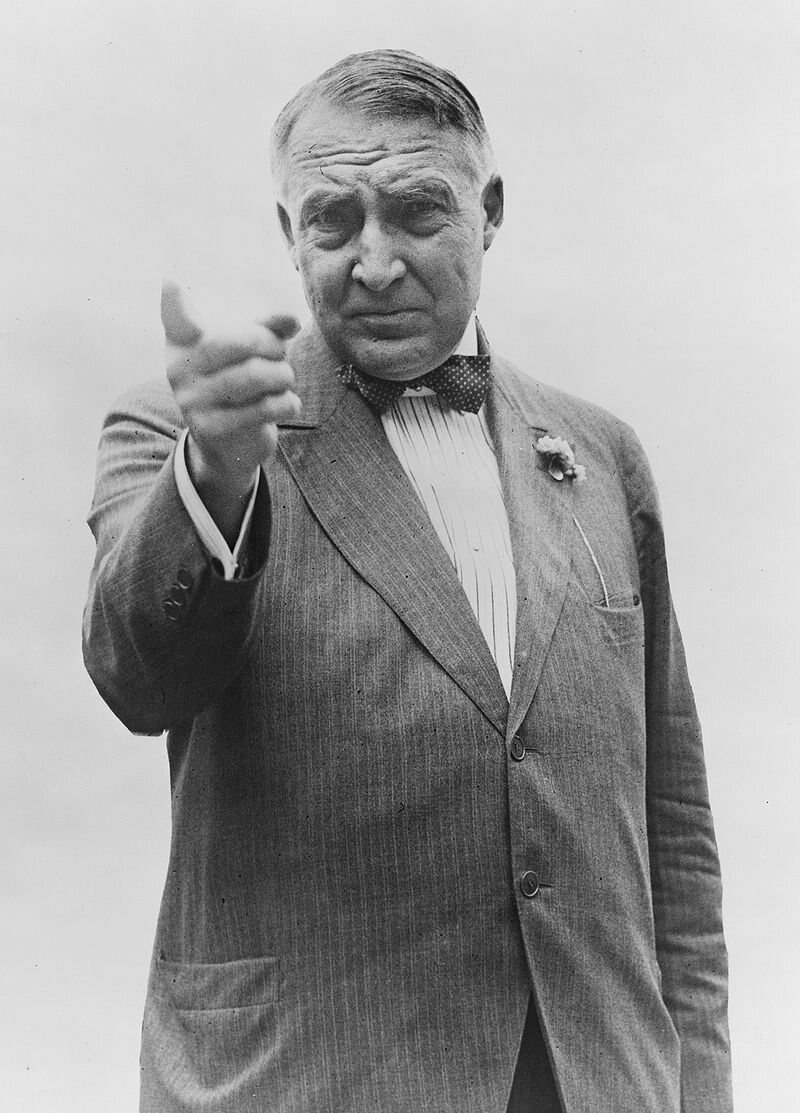Warren G. Harding
Warren G. Harding by John W. Dean
Tier 4
Harding begins the last stretch of presidents I dreaded reading about. Well, maybe dread is too strong a word, but this run (Harding, Coolidge, Hoover) certainly didn’t excite me. I was pleasantly surprised by one (Hoover), hated another (Coolidge), and was bored by the third. That was this one.
John W. Dean, the author of this work, was best known for his involvement in another scandalous presidency—Richard Nixon’s. He was a key component of the Watergate scandal and, after spending his youth as a Goldwater Conservative, became a strong critic of the Republican Party. It’s possible some of his personal history influenced this book, but for whatever reason, he is exhaustively apologetic for Harding. I think his failure to criticize his subject more was partially at fault for the book’s lack of excitement.
Warren G. Harding was a bad president. No matter how much Dean and other historians try to reshape his legacy, it is an inescapable fact that he was a below-average president. He was not, as some have claimed, the worst president. He did not cause or undo the Civil War, he did not needlessly cost hundreds of thousands of American lives, and he did not bankrupt the world economy. These are distinctions that other presidents carry. Harding was bad but not cataclysmic.
Upon his death from a heart attack during his first time, Harding was beloved. At the time, he would’ve ranked among the most popular and greatest presidents in United States history. Part of that is our natural propensity to lift the dead to the status of saints, but part of it was his reputation. He was seen as even and clean. He was a man of peace in the aftermath of what, at the time, was considered the worst war imaginable. He brokered an international agreement to limit naval expansion and promised to keep the United States out of conflicts, a promise he kept during his short presidency.
But time has a way of reshaping history, and within a decade after his death, Harding’s name was synonymous with corruption and vice. The primary cause of this fall from grace was a series of scandals and an affair. The most notable of these scandals was Teapot Dome.
Before Watergate, this was the definitive presidential scandal in American history. It centered, as so much of America did then (and now), on oil. Essentially, there were some oil reserves that the Navy had set aside in case of emergency. Let’s say the United States was at war and needed to send ships around the globe, it would be good to have some oil on tap. Of course, businessmen didn’t agree with this idea. They wanted to drill it. Harding’s Secretary of the Interior, Albert B. Fall, agreed… for a price. He then took a large bribe in exchange for drilling leases bought from the government at low prices.
Honestly, given the expectations we have for our politicians these days, this seems expected, but at the time, it was quite the scandal. There is no evidence that Harding knew about Fall’s actions, but that hardly is an excuse. The president is responsible for his cabinet, and Harding bares some of the weight for Teapot Dome (for a more detailed book on this scandal that had wide-ranging implications and spelled the beginning of our nation’s corrupt relationship between big oil and politics, see Laton McCartney’s book The Teapot Dome Scandal).
There were other scandals. Harding appointed Harry M. Daugherty, a lobbyist and back-room politician with a well-earned reputation as a scoundrel, as Attorney General. Daugherty was never convicted of anything, but it’s widely assumed he was corrupt.
And then there was Charles R. Forbes, the director of the Veterans’ Bureau, who was a particularly slimy individual. He was tasked with setting up hospitals nationwide to care for the 300,000 wounded World War I veterans. Being the terrible person he was, he saw this as an opportunity to enrich himself. He defrauded the government by inflating construction and land costs and splitting the profits with his friends and the contractors. But he didn’t stop there. He started selling much-needed medical supplies at a fraction of their cost and pocketed the profit. Again, Harding did not know about Forbes’ actions at the time, but when he found out, instead of punishing him, he allowed Forbes to resign and flee to Europe. This was consistent with Harding’s actions as president. He was far too concerned with avoiding the appearance of scandal instead of rooting out the rampant corruption in his administration.
Harding also had a fifteen-year affair with a woman named Carrie Fulton Phillips. This came to light after his death and further hindered his reputation. There were rumors of other affairs and children out of wedlock.
These scandals, paired with Harding’s poor handling of the railroad strike of 1922, the Bonus Bill, and his general pro-business stance, have shaped his reputation. Historians have attempted to rehabilitate him, Dean first among them, but it rings hollow. As I said, he was not the worst president, as is sometimes claimed, but he was bad. He may not have known about the actions of people like Fall, Daugherty, and Forbes, but he appointed them and created an atmosphere where corruption could take hold. It could've been excused if it had been one scandal or one greedy appointment. Everyone makes mistakes. However, Harding’s administration was rooted in corruption and graft. That is on him.
In general, this short, dull book reads more like a man trying to defend a friend than a biography. I wouldn’t recommend it.
